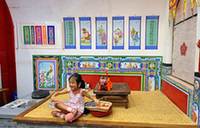Official dismisses China-ROK rivalry in cultural accreditation
( Xinhua ) Updated: 2014-03-21 09:35:44An official of China's Ministry of Culture has attempted to calm public rivalry between China and the Republic of Korea (ROK) over claims of competition in applications for UNESCO's intangible cultural heritage (ICH) status.
UNESCO ICH status, an accreditation scheme for non-tangible cultural elements, is not like a trademark that rules out other countries' claims, said Ma Shengde, deputy director of the ministry's ICH administration department, late on Tuesday.
|
|
 |
Ma's comments came following an online row between netizens in China and the ROK regarding the origin of an indoor heating system known in China as "Nuan Kang" and in the ROK as "ondol."
The ROK is reportedly seeking UNESCO world cultural heritage status for "ondol," heating architecture in its traditional houses which uses under-floor flues connected to a stove to heat up the rooms.
Chinese netizens, however, argued that a similar structure is also widely seen and used in northern China, and that it may enjoy a much longer history in the country.
"The ROK is preaching that Koreans have invented the entire universe," jested an Internet user with the screen name "Gongyinxia" on Sina Weibo, a Chinese equivalent of Twitter, complaining of cases in which the ROK has made ICH applications for items believed to have been appropriated from China.
"Chinese people's concerns for the country's ICH protection can be taken as a positive signal of citizens' increasing cultural consciousness," Ma said.
However, it should be made clear that an ICH status is not exclusive, as one country's application will not disqualify other countries' joint or respective applications, he added.
The official noted that similar ICH items may have diversified features in different countries, citing another controversial ICH item secured by the ROK, the Gangneung Danoje Festival, which the Chinese claimed to be a Chinese-originated tradition.
Though both are called "Duanwu" in Chinese, the Korean festival in the ROK observes different traditions than the traditional Dragon Boat Festival in China, Ma said.
He urged Chinese people to cherish their own culture, and at the same time appreciate other countries' cultures and share the beauty of cultural treasures with all mankind.
According to Ma, China dominates the UNESCO ICH list with 38 items.
Intangible cultural heritage can be defined as song, music, drama, crafts and similar skills that can be recorded but not touched or interacted with. It is promoted by UNESCO as a counterpart to its World Heritage status.
|
|
|
|
|
|
|
|






















 Raymond Zhou:
Raymond Zhou: Pauline D Loh:
Pauline D Loh: Hot Pot
Hot Pot Eco China
Eco China China Dream
China Dream China Face
China Face





